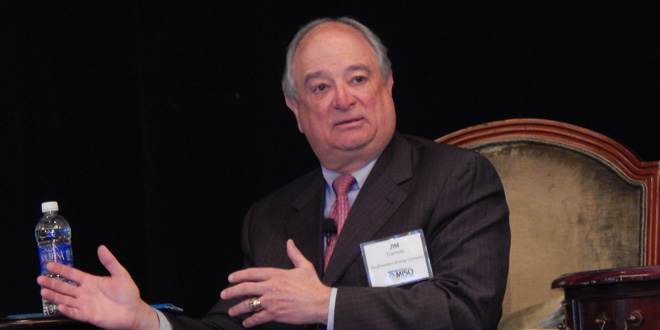By Rich Heidorn Jr.
MILWAUKEE — Gas producers are “listening loud and clear” to environmental concerns about fracking, James Tramuto, vice president of governmental and regulatory strategies for Southwestern Energy, said at the MISO Annual Meeting last week.
Southwestern Energy, the fourth-largest natural gas producer in the U.S., has committed to becoming a net-zero user of fresh water in its operations by the end of the year. “We’ll get there through conservation,” Tramuto said during a panel discussion. The company currently claims to use rainwater collected in ponds and water recycled from its operations for 83% of its water use, with 17% from streams.
Southwestern is one of eight gas companies in the ONE Future Coalition, a voluntary effort whose members have pledged to reduce methane emissions from leaks or loss to 1% across the supply chain.
While gas is expected to increasingly displace coal-fired generation, and the industry has plentiful supplies, producers must address the “hot-button issues” of pollution and local moratoriums if it is to continue its growth, Tramuto said.
The Sierra Club, which won $80 million in donations from billionaire Michael Bloomberg for its “Beyond Coal” campaign — with a goal of retiring half of U.S. coal plants by 2017 — is also running a “Beyond Natural Gas” program, albeit without Bloomberg’s support.
Anti-gas protests have become a regular feature at open meetings of the Federal Energy Regulatory Commission.
“I would not discount the chance that gas may become the next ‘evil,’” said CAISO CEO Stephen Berberich, who also spoke on the panel.
Gas, Electric Schedules
Tramuto also commented on FERC’s efforts to better align the market schedules of the gas and electric industries. In April, the commission approved a rule adopting two gas scheduling changes but declined to move the start of the gas day to 4 a.m. CT from 9 a.m. CT. (See FERC Approves Final Rule on Gas-Electric Coordination.)
At the beginning of the scheduling discussions, Tramuto said, “people weren’t talking to one another, they were talking past one another and not really understanding the other side and what their needs were versus what our capabilities are.”
He added, “It’s the first time I’ve seen in a long time that the gas community collectively — that was the producers side, the pipelines, the whole group — all spoke with one voice on not changing that 9 a.m. start time.”




